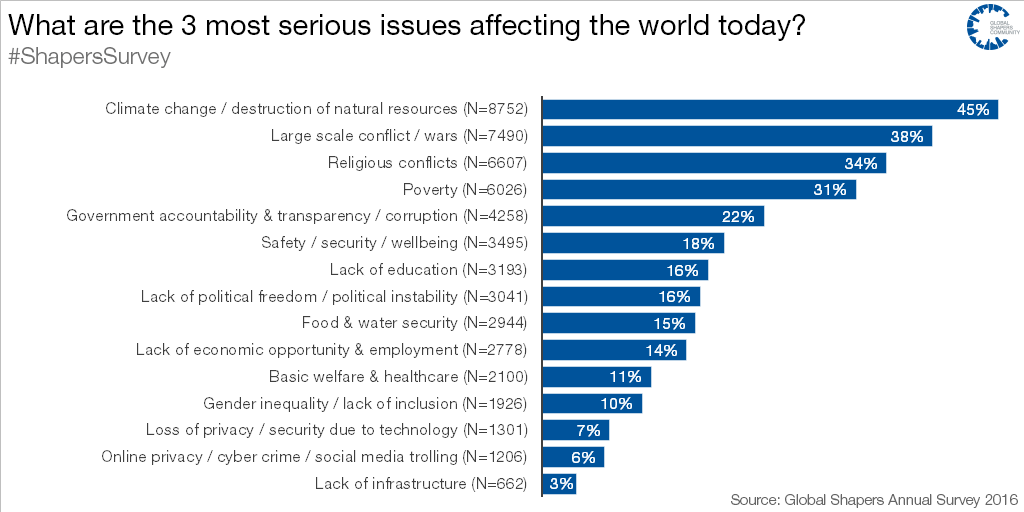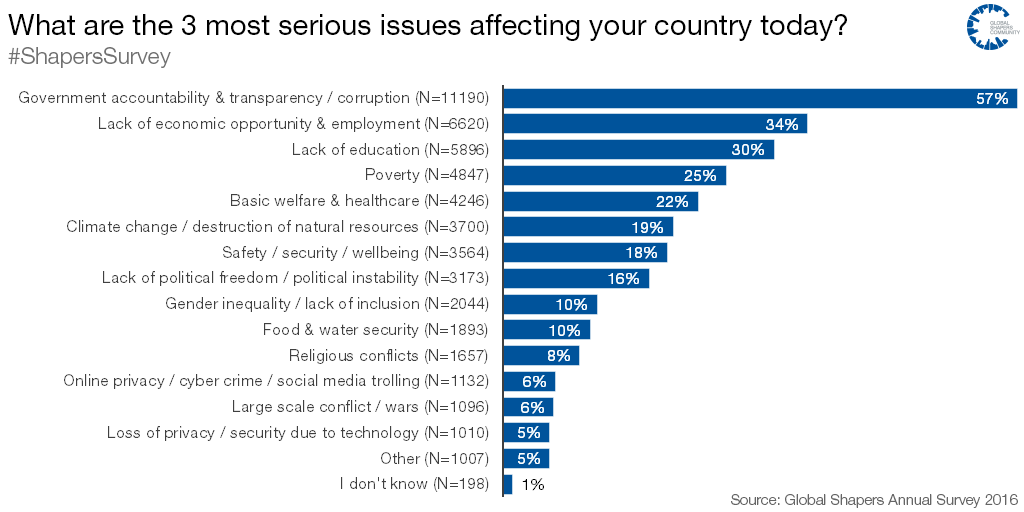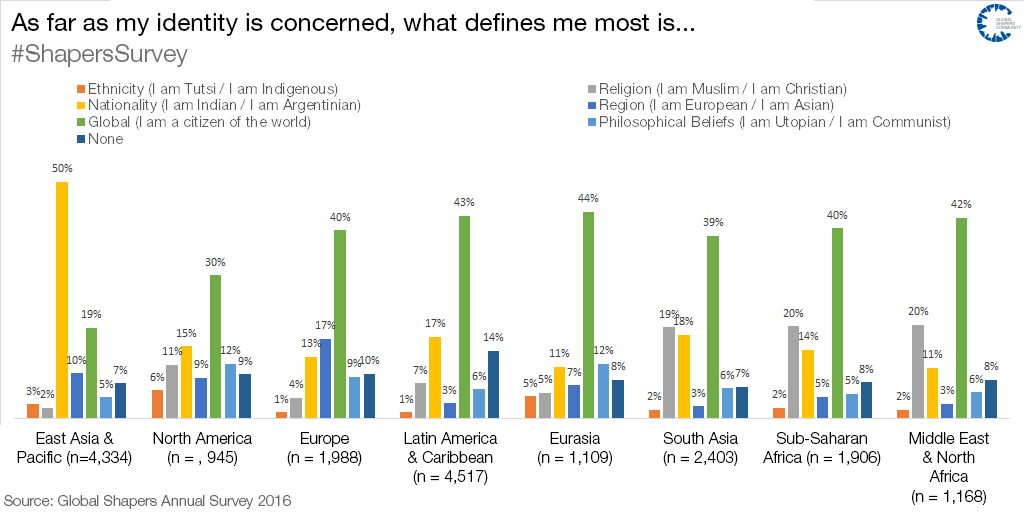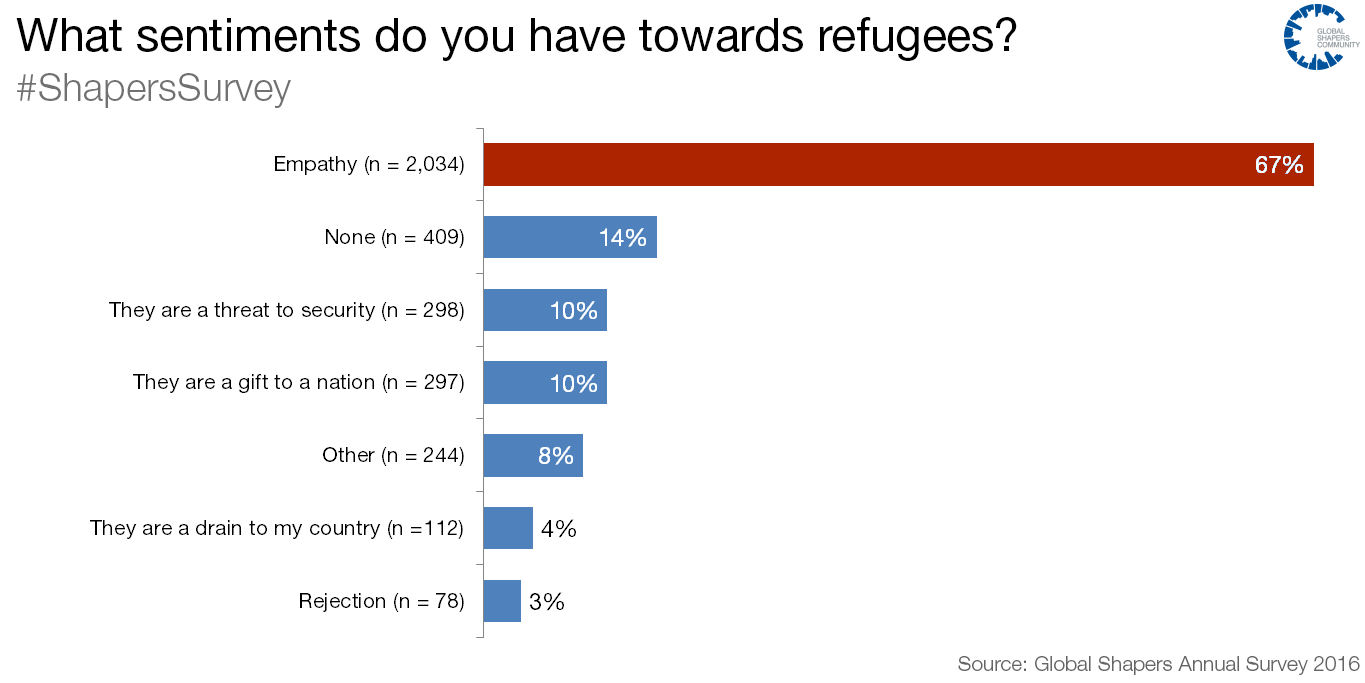SUMMARY
This is AI generated summarization, which may have errors. For context, always refer to the full article.

MANILA, Philippines – Despite news cycles around the world dominated by conflicts, disasters, and the destructive effects of climate change, overwhelming majority of the world’s youth still retain a sunny outlook on the future, according to the World Economic Forum.
So bright, in fact, that 70% of respondents to WEF’s Global Shapers Annual Survey 2016 see the world as full of opportunities, with 50% believing they can actively contribute to decision-making in their countries.
The survey, which was released this week, looks to give an insight into the world’s 18-35 year olds, now collectively tagged as millennials, and incorporates more than 26,000 participants from 181 countries speaking 9 languages.
Problem-solvers

While they remain optimistic, millennials aren’t oblivious to global issues. Majority of them (45%) say that climate change is the world’s most pressing concern, followed by large-scale conflict and wars.

Corruption dominates their list of worries in their respective countries. Lack of economic opportunities is also a concern at 34%.
But they’re confident that they can tackle these problems head-on: millennials trust themselves most with solving local challenges (26%), followed by challenges posed by governments (20%) and civil society (17%).
When it comes to their own careers, millennials prioritize jobs that provide a fair salary (54%), a growth perspective (45%), and a sense of purpose (36%). 74% are confident, or extremely confident, that they bring the rights skills to the job market.
There is less optimism for available career opportunities, however, with only 54% optimistic or very optimistic about their job prospects.
Worldy and open
While global sentiment seems to be turning inwards with concerns over immigration currently at their highest since World War II, millennials are seemingly bucking the trend.
Young people between 18-35 define themselves as “global citizens” at 36% while another 22% of respondents see their nationality as their defining character, and 9% define themselves most strongly through their religious beliefs.
Younger millenials aged 18-22 however say that their nationality is their defining identity, with global citizens a close second.
Regional culture plays a large part in this, with youths from the Middle East and South Asia more likely to identify themselves through religion while those from East Asia and the Pacific tending to define themselves more through nationality.

When asked about the refugee crisis gripping the world, the majority or 67% of respondents describe their feelings towards refugees as “empathy.”
Millennials with stronger views on refugees comprise only 20%. These views are divided evenly between those who describe refugees “as gifts to their nation” and the polar opposite – “those who see them as threat.”
Tellingly, 73% would welcome refugees to their countries while 22% of respondents would go so far as to accept refugees into their own homes.

Progessive, tech-driven
The survey results point to millennials having generally progressive values, although not by an overwhelming margin.
Globally, more than half of the respondents or 53% support same sex marriages, while 13% agree somewhat and 13% are undecided. The remaining 22% oppose it.
WEF noted that when cross-referenced with human development indices from the UN and World Bank, support for same-sex marriage correlates to a country’s development levels. The exceptions to this are the Middle East and Africa where a majority of young people disagree or strongly disagree.
A similar picture emerges on the question of unmarried couples having a child: 70% globally find it acceptable, with the majority of young people from the Middle East and Africa in opposition.
Millennials are also fully embracing new technology with 86% of respondents believing that technology, while destroying some jobs, will eventually be the driver of job growth.
Young people all over the world are also fully embracing the potential of new technologies, especially artificially intelligence, robots, and the internet of things, and say that they use digital technologies daily.
They also believe that the areas most affected by technology within their own lives will be their careers (65%), education (55%) and mobility (42%).
They are wary about data privacy, however, with 73% saying they have avoided downloading certain apps out of concern for private data. Neverthless, 86% of respondents said that they believe that technology, while destroying some jobs, will eventually be a driver of job growth.
Driving economies
What some millennials may not realize is that in many developing countries, they themselves – through sheer numbers – have become the key engines of growth.
Nowhere is this more apparent than in the Philippines, which features a median age of just 23 and is looking forward to a sizable demographic dividend.
The low median age coupled with a declining fertility rate will eventually lead to an dramatic increase in the number of working adults who will drive domestic demand and spur economic growth.
The seeds of this are already apparent with millenials dominating key growth sectors especially the BPO industry. They are having an even larger effect on consumption, the mainstay of the local economy where their increased spending has forced firms to change the way they operate. (READ: How the Millenial consumer is reshaping the PH economy)
All that consumption has also provided consumer-focused firms with the money to venture outside the country’s borders for the first time.
So it’s just as well that millennials have a sunnier outlook compared to the rest of the world. After all, they will be the ones running it in the not too distant future. – Rappler.com
Add a comment
How does this make you feel?

There are no comments yet. Add your comment to start the conversation.